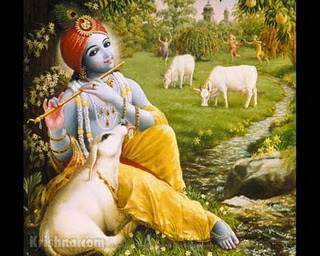
Janmastami is the most important day of the year for devotees of Lord Krsna. Five thousand years ago Krsna appeared as the eighth son of Vasudeva and his wife Devaki. Janmastami is so named because Lord Krsna's birth (janma) occurred on the eighth day (astami) of the waning moon during the month of Hrsikesa (August-September).
The Srimad-Bhagavatam tells the history of the Lord's advent:
At the time of the marriage of Vasudeva and Devaki, a voice from the sky foretold that the couple's eighth son would kill King Kamsa, Devaki's evil brother. Kamsa therefore imprisoned Vasudeva and Devaki and placed guards to watch over them closely.
By His own potency, Lord Krsna appeared within the prison cell as the son of Vasudeva. He made the guards fall asleep and the prison doors spring open. Vasudeva, to protect his son, carried baby Krsna across the Yamuna River to Vrndavana, a village of cowherds. Vasudeva turned Krsna over to the protection of his dear friend Nanda Maharaja, the leader of the village.
Nanda Maharaja celebrated Krsna's birth with great pomp and splendor. Following custom, he gave generously to the brahmanas gold ornaments, hills of grain, and thousands of cows. The brahmanas chanted Vedic mantras to invoke good fortune for the newborn child. Cowherd men and women bearing gifts came from all over Vrndavana to join the wonderful celebration. Men, women, and children danced and chanted in ecstasy, and joyous sounds could be heard throughout the village.
Today, in temples throughout the world devotees of Lord Krsna celebrate Janmastami with great splendor. The festivities include chanting, dancing, processions, the bathing of Lord Krsna, and dances and dramas depicting the pastimes of the Lord. At midnight, after fasting all day, devotees worship Lord Krsna and then enjoy a sumptuous feast prepared and offered to the Lord with love and devotion.
Research by Raghunandini Dasi,
Girls Vaisnava Academy, Alachua, Florida
